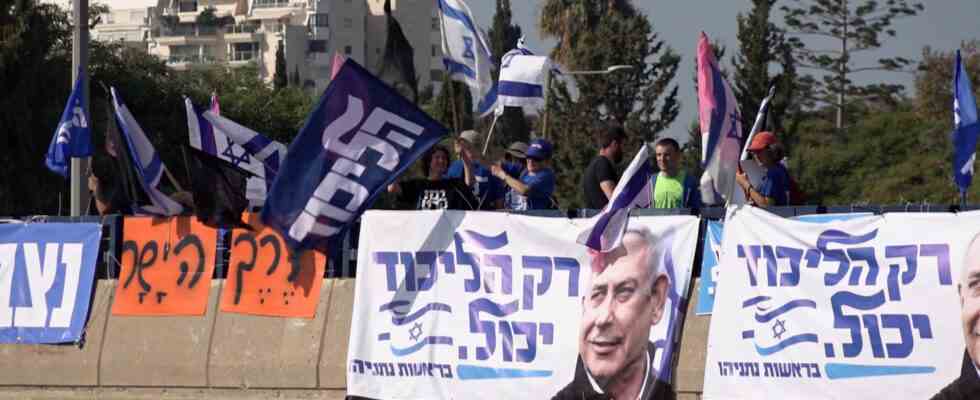Status: 31.10.2022 10:50 a.m
Shortly before another fateful election in Israel, part of the election campaign has shifted to highway bridges. This is where Netanyahu opponents meet his supporters – and argue.
Living in Israel spends a lot of time stuck in traffic, especially on the multi-lane highways. For Ayelet Perlman, the motorway bridges are therefore the ideal place for election campaigns and protests. “Everyone here sees us and sees that we are there and that we are strong,” he says, waving the Israeli flag. Next to it, she holds a pink and a black flag, which have become symbols of the anti-Netanyahu movement.
Since 2019, people have been gathering on the highway bridges for demonstrations against former Prime Minister Benjamin Netanyahu. They were protesting a prime minister who was on trial over corruption charges. Her slogan back then: “Go!” Now their banners say “Thou shalt not come back!”
Ayelet Perlman is 20 years old and will be voting for the fourth time on Tuesday – she wants to prevent Netanyahu’s return.
Image: Sophie von der Tann
Narrow majority possible for alliance around Netanyahu
According to polls, Netanyahu’s Likud party could become the strongest party in parliament with around 30 seats. With an alliance of ultra-right and religious parties, Netanyahu could just about get 61 of the 120 seats, depending on the poll.
Ayelet Perlman wants to prevent this and has therefore been coming to the bridge a few kilometers north of Tel Aviv with her parents for the past two months. She is only 20 years old and will vote for the fourth time on Tuesday. For her parents it is the fifth general election in less than four years. “I’m afraid that if Yair Lapid doesn’t win, we’ll lose our democracy,” says her father Ronen.
Naval treaties, fake news, split
He is then interrupted by other activists on the bridge: Netanyahu’s supporters waving blue Likud flags. They begin to discuss – about the recently sealed sea agreement between Israel and Lebanon, about fake news and the division in the country.
Boaz Kokia does not see that Netanyahu fueled this. He is a Likud campaigner who lost his son in an attack in 2017 and sees Netanyahu as a defender of Israel’s security. The fact that ultra-rightists like Itamar Ben Gvir could also get ministerial posts in his possible coalition doesn’t bother him. “Itamar Ben Gvir has become more moderate,” says Boaz. Ben Gvir used to shout “Death to the Arabs!” Today he says “Death to the terrorists!” – “I agree with that,” says Boaz Kokia.
Contrasting opinions collide on this highway bridge, but at least it remains peaceful. Anti-Netanyahu protesters were repeatedly attacked in September. “They seem to have changed strategy,” says Ayelet. Because every time after such attacks, more people came to demonstrations against Netanyahu – in the hope of a government around interim Prime Minister Lapid.
He sees Netanyahu as a defender of Israel’s security: Boaz Kokia is demonstrating on the same bridge as Ayelet Perlman.
Image: Sophie von der Tann
Lapid’s coalition lasted a year
Its coalition, made up of a broad spectrum of right-wing and left-wing parties, religious and secular, and an Arab party, had lasted for a year. But their common denominator – preventing Netanyahu – was no longer strong enough. According to the polls, Lapid’s party will come in second. He, too, is dependent on coalition partners, but some of the small parties in his bloc are scratching the entry hurdle of 3.25 percent for the Israeli parliament.
The most important thing is therefore to convince people to vote, says Uzi Doron, who has been coming to the protests for years. He wants to give his vote to the party that needs it most to get into parliament. It doesn’t matter whether it’s the green Meretz party, the left-wing Awodah party or even an Arab party. He will only decide on election day. If the small parties don’t make it into parliament, it strengthens Netanyahu’s bloc. And he’s also fighting for every vote – mobilizing voters, a goal shared by the two blocs.
“Honk for us!” – “No, for us”
Uzi Doron has to speak loudly because the drivers in the traffic jam honk their horns at the flag-wavers at the top of the bridge. “They honk for us,” say some. “No, for us,” say the others. Before this election, the activists stand atop the bridge with their flags for the last time. But should there be a stalemate without a majority for either Netanyahu or Lapid, as some polls are predicting, they could all be here again in the spring, campaigning again.

